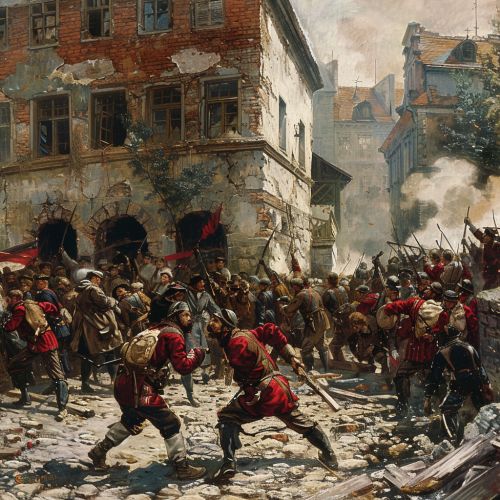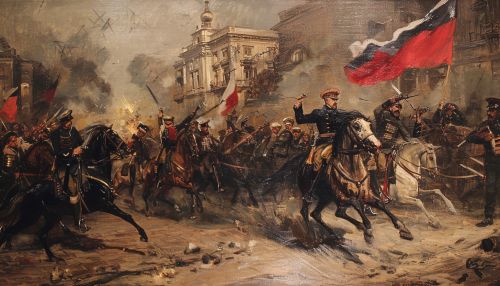November Uprising: Difference between revisions
No edit summary |
No edit summary |
||
| Line 9: | Line 9: | ||
The uprising began on the night of November 29, 1830, in Warsaw. A group of young Polish officers from the Warsaw Military Academy, led by Lieutenant Piotr Wysocki, initiated the rebellion by attacking the Belweder Palace, the residence of the Russian-appointed Grand Duke Constantine. Although the attempt to capture the Grand Duke failed, the insurrection quickly spread throughout Warsaw and other parts of the Kingdom of Poland. | The uprising began on the night of November 29, 1830, in Warsaw. A group of young Polish officers from the Warsaw Military Academy, led by Lieutenant Piotr Wysocki, initiated the rebellion by attacking the Belweder Palace, the residence of the Russian-appointed Grand Duke Constantine. Although the attempt to capture the Grand Duke failed, the insurrection quickly spread throughout Warsaw and other parts of the Kingdom of Poland. | ||
[[Image:Detail-79793.jpg|thumb|center|Depiction of the November Uprising in Warsaw, showing Polish insurgents clashing with Russian forces.]] | [[Image:Detail-79793.jpg|thumb|center|Depiction of the November Uprising in Warsaw, showing Polish insurgents clashing with Russian forces.|class=only_on_mobile]] | ||
[[Image:Detail-79794.jpg|thumb|center|Depiction of the November Uprising in Warsaw, showing Polish insurgents clashing with Russian forces.|class=only_on_desktop]] | |||
== Key Battles and Military Campaigns == | == Key Battles and Military Campaigns == | ||
Latest revision as of 07:59, 20 May 2024
Background and Causes
The November Uprising, also known as the Polish-Russian War 1830-1831, was a significant armed rebellion against the Russian Empire's dominance over the Kingdom of Poland. The uprising was primarily driven by the desire for national sovereignty and the restoration of Poland's independence, which had been lost in the late 18th century due to the Partitions by Russia, Prussia, and Austria.
The roots of the uprising can be traced back to the Congress of Vienna in 1815, which re-established the Kingdom of Poland under Russian control. Although the kingdom was granted a constitution and a degree of autonomy, the Russian Tsar Alexander I and his successor Nicholas I increasingly violated these terms. The suppression of political freedoms, the imposition of censorship, and the presence of Russian troops in Poland fueled widespread discontent among the Polish population.
Outbreak of the Uprising
The uprising began on the night of November 29, 1830, in Warsaw. A group of young Polish officers from the Warsaw Military Academy, led by Lieutenant Piotr Wysocki, initiated the rebellion by attacking the Belweder Palace, the residence of the Russian-appointed Grand Duke Constantine. Although the attempt to capture the Grand Duke failed, the insurrection quickly spread throughout Warsaw and other parts of the Kingdom of Poland.


Key Battles and Military Campaigns
The November Uprising saw several significant battles and military campaigns. One of the earliest and most crucial engagements was the Battle of Stoczek on February 14, 1831, where Polish forces under General Józef Dwernicki achieved a notable victory against the Russian army. This victory boosted the morale of the Polish insurgents and demonstrated their capability to challenge Russian military power.
Another pivotal battle was the Battle of Olszynka Grochowska, fought on February 25, 1831. Despite being outnumbered, the Polish forces, led by General Józef Chłopicki, managed to hold their ground against the Russian army. The battle was one of the bloodiest of the uprising and highlighted the determination and resilience of the Polish fighters.
The Battle of Ostrołęka, fought on May 26, 1831, was a turning point in the uprising. The Polish forces, commanded by General Jan Skrzynecki, suffered a devastating defeat at the hands of the Russian army. This loss significantly weakened the Polish resistance and marked the beginning of the decline of the uprising.
Political and Social Impact
The November Uprising had profound political and social implications for Poland and the broader European context. In the immediate aftermath, the Russian Empire imposed harsh reprisals on the Kingdom of Poland. The Polish constitution was abolished, and the kingdom was incorporated more directly into the Russian Empire. The University of Warsaw and other cultural institutions were closed, and many Polish leaders and intellectuals were exiled to Siberia or other remote regions of Russia.
The uprising also had a lasting impact on Polish society. It fostered a sense of national identity and solidarity among Poles, which would continue to inspire future generations in their struggle for independence. The memory of the uprising was kept alive through literature, art, and music, becoming a symbol of Polish resistance and patriotism.
International Reactions
The November Uprising attracted significant international attention and sympathy, particularly from France and the United Kingdom. Many European liberals and intellectuals viewed the Polish struggle as part of the broader fight for freedom and national self-determination. However, despite the widespread support, no foreign government was willing to intervene militarily on behalf of the Polish insurgents.
The lack of international intervention was partly due to the complex diplomatic landscape of the time. The major European powers were wary of provoking a larger conflict with Russia, and their own domestic concerns often took precedence over the Polish cause. Nonetheless, the uprising influenced European political thought and contributed to the growing discourse on national sovereignty and human rights.
Legacy
The legacy of the November Uprising is multifaceted. It is remembered as a heroic but ultimately doomed struggle for Polish independence. The uprising's leaders, such as Piotr Wysocki, Józef Chłopicki, and Jan Skrzynecki, are celebrated as national heroes. The events of 1830-1831 also served as a catalyst for subsequent uprisings, including the January Uprising of 1863-1864.
The November Uprising left an indelible mark on Polish culture. It inspired numerous works of literature, including poems by Adam Mickiewicz and novels by Henryk Sienkiewicz. The uprising's themes of sacrifice, bravery, and the quest for freedom continue to resonate in Polish national consciousness.
